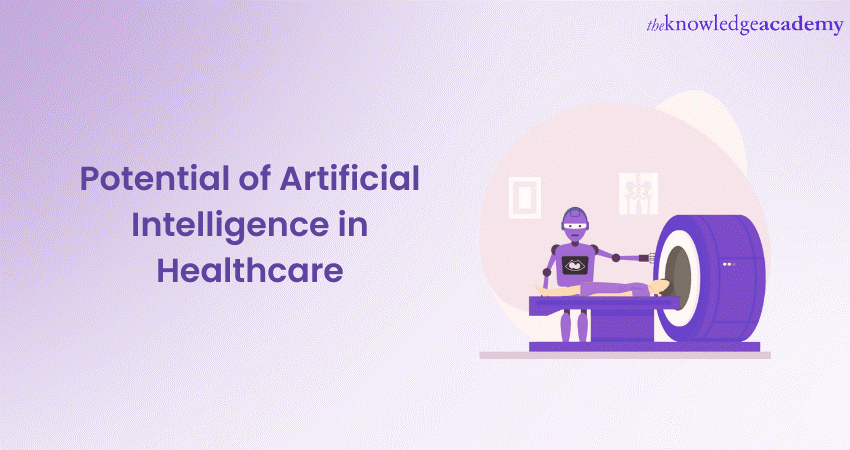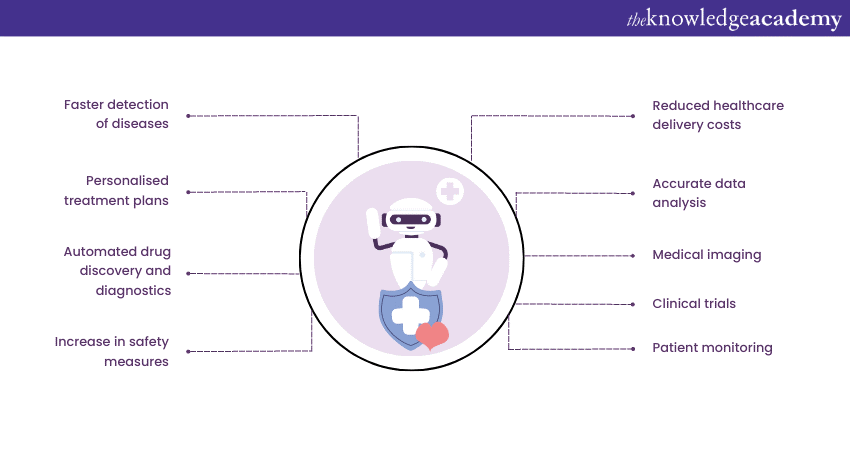We may not have the course you’re looking for. If you enquire or give us a call on +91-181-5047001 and speak to our training experts, we may still be able to help with your training requirements.
Training Outcomes Within Your Budget!
We ensure quality, budget-alignment, and timely delivery by our expert instructors.

The recent Covid-19 pandemic has highlighted the need to bring drastic changes in the Healthcare sector. Harnessing the benefits of the latest technologies, especially Artificial Intelligence (AI), is essential for the sector. There is a lot of potential in using Artificial Intelligence in Healthcare.
According to Acumen Research and Consulting, the international AI in Healthcare market is estimated to reach around 6 billion GBP by 2026. Read this blog to learn about Artificial Intelligence in Healthcare, the impact of AI on the sector, its benefits, and how AI helps develop clinical devices.
Table of Contents
1) What is Artificial Intelligence in Healthcare?
2) Impact of Artificial Intelligence on Healthcare
3) Benefits of Artificial Intelligence in Healthcare
4) How AI helps manufacture clinical devices?
5) Role of Artificial Intelligence in Healthcare
6) Conclusion
What is Artificial Intelligence in Healthcare
Understanding AI is important to understand its role in the Healthcare sector. When machines are given superpowers to make decisions and operate independently, it is known as Artificial Intelligence. Previously, machines used to work on the commands their operators gave, but technological developments have made them independent. Now machines can not only make decisions on their own, but they can also work with minimal human intervention and supervision.
Artificial Intelligence in Healthcare help make a more precise diagnosis and give accurate results of treatments. AI can transform the Healthcare sector dramatically. It can read and process data types, like clinical documentation, at a large scale. This ability of AI has helped enhance the efficiency and effectiveness of the healthcare sector to be more precise and accurate.
Unlock your AI skills and potential with our Deep Learning Training!
Impact of Artificial Intelligence on Healthcare
The most revolutionary use of Artificial Intelligence in Healthcare is 'precision medicine'. The ability to predict the treatment procedures most suitable for patients, based on their treatment framework, is a giant leap for the Healthcare industry. Recently, IBM's Watson has attracted much media coverage for its achievements in precision medicine. The company employed a combination of Machine Learning (ML) and Natural Language Processing (NLP) capabilities to develop it. AI technology in Healthcare uses ML and precision medicine applications. For this, they require medical images and clinical data. This process is known as 'supervised learning'.
Google's DeepMind Health is another example of the application of Artificial Intelligence in Healthcare. It works with researchers, medical professionals and patients to solve real-world Healthcare problems. It combines machine learning and systems neuroscience, which works similarly to the human brain. Let's discuss the impact of Artificial Intelligence in Healthcare.
Diagnosis based on data analysis
The most important feature of AI in Healthcare is that it can gather and analyse large amounts of data. Process automation with AI's help allows analysing huge amounts of data quickly. Today, AI is used to analyse image data to examine molecular structure during the drug discovery process. It's also of great use for radiologists to analyse and diagnose patients. An increasing number of doctors and hospitals are analysing data with the help of AI to simplify their operations and provide better treatment to patients.
Personalised treatment with more insightful clinical data
AI can also empower patient self-service with the help of chatbots. These chatbots resolve patients' queries and provide personalised responses based on data analysis. This helps Healthcare organisations increase their productivity and efficiency. Moreover, using large datasets and machine learning, Healthcare organisations can find insights faster and more accurately with AI. This enables improved user-centric experiences.
Diagnosing patients with faster computer-aided analysis
Scientists are using AI for medical tests called Coronary Computed Tomography Angiography (CTA). This technique can be used to predict heart attacks. It takes 3D images of the heart and arteries. Plaque, which causes blockage in arteries, is detected in CTA images. Normally it takes around half an hour to measure the amount of plaque. But the AI algorithm enables a computer to perform the same task within seconds.
Researchers feed a computer several coronary CTA images that experts have already analysed. This way, the computer reads and learns how to identify and measure plaque in the images. The AI algorithm's measurements have accurately predicted several incidences of heart attack within five years of its induction.
Apart from heart diseases, AI is also being used to identify the chances of breast cancer development in healthy people. This prediction is based on information hidden in mammograms. AI can also predict which memory care clinic patients will likely develop dementia within two years. AI has aided in the early detection of diabetes and acute kidney injury also.

Patient monitoring
Hospitals generally have multiple patients in critical condition who need proper and continuous monitoring. Limited mobility in prolonged treatments can adversely affect the patient's recovery. So, monitoring their activity is very important. Researchers tried installing sensors with AI algorithms in ICUs to track patients' mobility. It proved to be a huge success for them.
AI in clinical trials
Drug development is one of the biggest challenges in the Healthcare industry. On average, a drug reaches patients from the research labs in 12 years. Further, five out of 5,000 drugs make it human testing. Moreover, out of these five, only one is ever approved for use by humans. Also, it’s not a matter of time only. On average, it costs a company significant money to develop a new drug. Almost half of the time in drug development is spent on clinical trials only. Using AI technology, researchers can now identify the right patients to participate in the experiments. They can also monitor their medical responses. It saves both time and money.
With the help of AI, patients suffering from neurological diseases and trauma to the nervous system are also treatable. It is found that patients’ abilities to speak, move, and interact meaningfully with people have been restored using Brain-Computer Interfaces (BCIs) backed by AI.
Another example of clinical trial is immunotherapy for treating cancer patients. In this therapy, the body’s own immune system is activated to attack malignancies which helps treat tumours. When done through the current immunotherapy options, it is observed that only a small number of patients respond. But AI algorithms can help find new solutions for developing therapies that target an individual's unique genetic makeup.
Medical imaging
AI technology in medical imaging has enabled cardiologists and radiologists to identify critical cases. By providing accurate images, AI makes more accurate diagnoses and avoids errors. A typical clinical study can produce vast datasets with several images. It might take more time to review these data. Imaging professionals can use AI algorithms to find critical information quickly.
Level up your AI expertise and harness the power of AI Tools with our AI Tools In Performance Marketing Training!
Benefits of AI in Healthcare
Artificial Intelligence (AI) has a groundbreaking impact on the Healthcare sector. It has reshaped the methods of diagnosis and treatment. AI technology has drastically improved Healthcare research also. AI can produce more accurate results in a shorter period and with less scope for ‘human error’. It has also made personalised treatments possible. By examining data patterns, AI technologies can help Healthcare organisations make the most of their data, assets and resources. It has increased efficiency and improved the performance of clinical and operational workflows, processes, and financial operations.

How AI helps manufacture clinical devices?
One of the most visible results of using AI in Healthcare is manufacturing medical/clinical devices. With the help of process automation, AI has significantly increased the production of clinical devices. It is possible because AI can process and interpret vast volumes of data beginning with the design level to the final level of production. It has helped in reducing operational time significantly.
AI has proved very helpful in detecting defects in the manufacturing of devices and hence improved the quality of the products. It’s not an easy task to manually maintain the standard and quality of products. Quality becomes an even more important aspect when it comes to medical devices. Quality assurance is a time taking process and requires highly skilled resources. With the help of AI-powered image processing technologies, even minor defects can be checked easily.
Researchers today are using AI-powered product designing systems to make new clinical devices. This system provides certain inputs, such as the device's purpose, materials used, the product's dimensions and size, etc. Based on the information analysis, the AI algorithm generates a few design suggestions. For example, AI has enabled next-generation radiology tools that provide accurate and detailed results. It will soon replace the need for tissue samples that carry infection risks.
Take your Natural Language Processing skills to the next level – sign up for our Natural Language Processing (NLP) Fundamental With Python Courses today!
History of Artificial Intelligence in Healthcare
The use of Artificial Intelligence in Healthcare dates back to the early 1970s when systems such as MYCIN were first introduced to provide diagnostic decision support. It was a computer-based consultation system designed to assist physicians in the diagnosis and therapy of patients with bacterial infections. It used Artificial Intelligence to identify bacteria causing severe infections, such as bacteraemia and meningitis. It also recommended antibiotics (with the dosage adjusted according to the patient's body weight) and detected blood clotting diseases.
Now, since the AI technology has gone through transformational advances and medical data has become increasingly available in digital form, we have witnessed a surge in successes of AI in healthcare.
Role of Artificial Intelligence in Healthcare
As Artificial Intelligence in Healthcare has advanced, using it to improve medical practices started making more sense now. With the development of AI-enabled medical tools, which can interpret large-scale data, the potential for using AI in Healthcare has no limits.
The future of Artificial Intelligence in Healthcare certainly has lots of potential and new opportunities. As the world moves towards a more digitalised future, applications of AI in the Healthcare industry will also increase significantly. It will change the way doctors treat patients and deliver care. With such great potential, it is clear that Artificial Intelligence will advance the Healthcare sector. One can expect improved health outcomes and better patient experiences with the help of AI.
Now AI is being used to detect diseases faster. Now the doctors do not need to wait for days for reports. The AI algorithm also provides personalised treatment plans to patients based on their medical history.
These days surgical robots are also being used to assist surgeons greatly. The first surgical robots were approved in the USA in 2000. These AI-enabled machines can examine and perform precise and minimally invasive incisions. Although these robots only assist surgeons, this technology is becoming smarter every day. Some areas where AI use in Healthcare is increasing are gynaecology, prostate and head and neck surgeries.
Conclusion
Artificial Intelligence in Healthcare offers several advantages over conventional clinical techniques. With the help of AI, learning algorithms can become more precise and accurate with diagnostics and treatment. AI in Healthcare presents a wide range of advantages and scope for exploration.
Want to master Machine Learning? Join our Machine Learning Training Course now!







 Top Rated Course
Top Rated Course



 If you wish to make any changes to your course, please
If you wish to make any changes to your course, please


